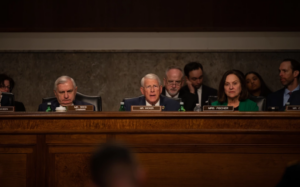
The Senate has passed a stopgap funding measure to avoid a government shutdown that now heads to the president’s desk and voted to move into formal conference negotiations with the House on the National Defense Authorization Act (NDAA). A day after the House voted 336-95 for the continuing resolution, the Senate on Wednesday evening approved the measure with an 87-11 vote that allows Congress additional time to complete work on final fiscal year 2024 appropriations bills. “I will vote for…

 By
By 











